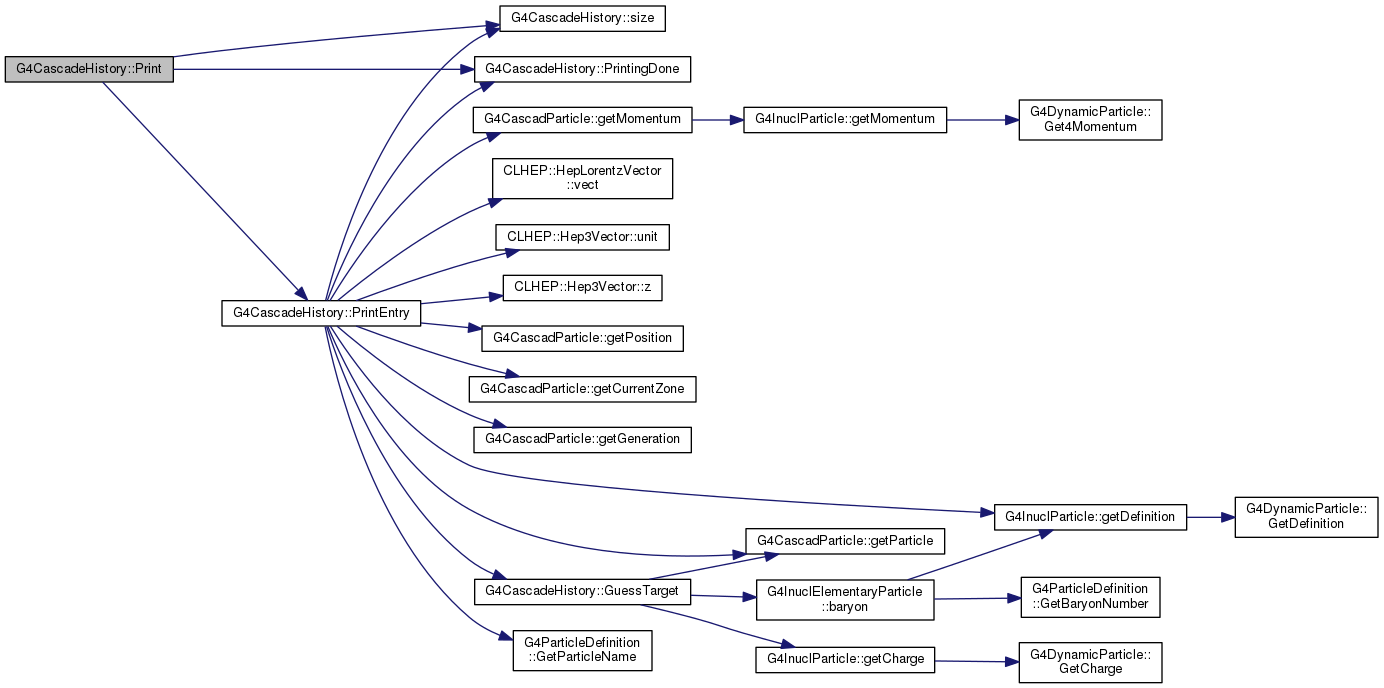#include <G4CascadeHistory.hh>
Definition at line 41 of file G4CascadeHistory.hh.
| G4CascadeHistory::G4CascadeHistory |
( |
G4int |
verbose = 0 | ) |
|
|
inline |
| G4CascadeHistory::~G4CascadeHistory |
( |
| ) |
|
|
inline |
Definition at line 106 of file G4CascadeHistory.cc.
112 G4cout <<
" AddEntry updating " <<
id <<
" " << &theHistory[id] <<
G4endl;
113 theHistory[id].cpart = cpart;
115 theHistory.push_back(HistoryEntry(cpart));
117 G4cout <<
" AddEntry creating " <<
id <<
" " << &theHistory.back() <<
G4endl;
120 if (verboseLevel>3)
G4cout << theHistory[id].cpart <<
G4endl;
void AssignHistoryID(G4CascadParticle &cpart)
G4GLOB_DLL std::ostream G4cout
G4int getHistoryId() const
Definition at line 59 of file G4CascadeHistory.cc.
61 if (verboseLevel>1)
G4cout <<
" >>> G4CascadeHistory::AddVertex" <<
G4endl;
68 G4cout <<
" entry " <<
id <<
" " << &theHistory[id] <<
" got "
69 << theHistory[id].n <<
" daughters:";
70 for (
G4int i=0; i<theHistory[id].n; i++) {
71 G4cout <<
" " << theHistory[id].dId[i];
G4GLOB_DLL std::ostream G4cout
G4int AddEntry(G4CascadParticle &cpart)
void FillDaughters(G4int iEntry, std::vector< G4CascadParticle > &daug)
Definition at line 137 of file G4CascadeHistory.cc.
140 if (verboseLevel>2) {
141 G4cout <<
" >>> G4CascadeHistory::NewHistoryID assigning ID "
void setHistoryId(G4int id)
G4GLOB_DLL std::ostream G4cout
G4int getHistoryId() const
| void G4CascadeHistory::Clear |
( |
| ) |
|
Definition at line 127 of file G4CascadeHistory.cc.
128 if (verboseLevel>1)
G4cout <<
" >>> G4CascadeHistory::DropEntry" <<
G4endl;
132 if (
id>=0) theHistory[id].n = -1;
G4GLOB_DLL std::ostream G4cout
G4int getHistoryId() const
Definition at line 80 of file G4CascadeHistory.cc.
84 G4cout <<
" >>> G4CascadeHistory::FillDaughters " << iEntry <<
G4endl;
87 theHistory[iEntry].clear();
89 theHistory[iEntry].n = nDaug;
90 for (
G4int i=0; i<nDaug; i++) {
92 theHistory[iEntry].dId[i] = id;
96 G4cout <<
" got " << theHistory[iEntry].n <<
" daughters:";
97 for (
G4int i=0; i<theHistory[iEntry].n; i++) {
98 G4cout <<
" " << theHistory[iEntry].dId[i];
G4GLOB_DLL std::ostream G4cout
G4int AddEntry(G4CascadParticle &cpart)
| const char * G4CascadeHistory::GuessTarget |
( |
const HistoryEntry & |
entry | ) |
const |
|
protected |
Definition at line 205 of file G4CascadeHistory.cc.
206 if (verboseLevel>2)
G4cout <<
" >>> G4CascadeHistory::GuessTarget" <<
G4endl;
208 if (entry.n < 0)
return "-O-";
209 if (entry.n == 0)
return "***";
212 if (verboseLevel>3)
G4cout <<
"cpart: " << cpart;
216 G4int targetQ = (
G4int)-cpart.getParticle().getCharge();
218 for (
G4int i=0; i<entry.n; i++) {
221 G4cout <<
"cdaug " << i <<
" ID " << entry.dId[i] <<
": " << cdaug;
228 if (targetB==1 && targetQ==0)
return "n";
229 if (targetB==1 && targetQ==1)
return "p";
230 if (targetB==2 && targetQ==0)
return "nn";
231 if (targetB==2 && targetQ==1)
return "pn";
232 if (targetB==2 && targetQ==2)
return "pp";
234 if (verboseLevel>2) {
235 G4cout <<
" ERROR identifying target: deltaB " << targetB
236 <<
" deltaQ " << targetQ <<
" from\n" << cpart <<
" to" <<
G4endl;
237 for (
G4int j=0; j<entry.n; j++) {
238 G4cout << theHistory[entry.dId[j]].cpart;
const G4InuclElementaryParticle & getParticle() const
G4GLOB_DLL std::ostream G4cout
G4double getCharge() const
| void G4CascadeHistory::Print |
( |
std::ostream & |
os | ) |
const |
Definition at line 156 of file G4CascadeHistory.cc.
157 if (verboseLevel) os <<
" >>> G4CascadeHistory::Print" << std::endl;
159 os <<
" Cascade structure: vertices, (-O-) exciton, (***) outgoing"
G4bool PrintingDone(G4int iEntry) const
void PrintEntry(std::ostream &os, G4int iEntry) const
| void G4CascadeHistory::PrintEntry |
( |
std::ostream & |
os, |
|
|
G4int |
iEntry |
|
) |
| const |
|
protected |
Definition at line 169 of file G4CascadeHistory.cc.
170 if (iEntry >=
size())
return;
173 entryPrinted.insert(iEntry);
175 const HistoryEntry& entry = theHistory[iEntry];
181 std::ios::fmtflags osFlags = os.flags();
183 os <<
"#" << std::setw(3+indent) << iEntry;
195 os <<
" -> N=" << entry.n << std::endl;
196 for (
G4int i=0; i<entry.n; i++) {
199 }
else os << std::endl;
G4LorentzVector getMomentum() const
G4bool PrintingDone(G4int iEntry) const
G4int getGeneration() const
const G4ParticleDefinition * getDefinition() const
const G4InuclElementaryParticle & getParticle() const
const G4String & GetParticleName() const
void PrintEntry(std::ostream &os, G4int iEntry) const
G4int getCurrentZone() const
const G4ThreeVector & getPosition() const
const char * GuessTarget(const HistoryEntry &entry) const
| G4bool G4CascadeHistory::PrintingDone |
( |
G4int |
iEntry | ) |
const |
|
inlineprotected |
Definition at line 83 of file G4CascadeHistory.hh.
84 return (entryPrinted.find(iEntry) != entryPrinted.end());
| void G4CascadeHistory::setVerboseLevel |
( |
G4int |
verbose = 0 | ) |
|
|
inline |
| G4int G4CascadeHistory::size |
( |
| ) |
const |
|
inlineprotected |
The documentation for this class was generated from the following files:
- source/geant4.10.03.p03/source/processes/hadronic/models/cascade/cascade/include/G4CascadeHistory.hh
- source/geant4.10.03.p03/source/processes/hadronic/models/cascade/cascade/src/G4CascadeHistory.cc
















